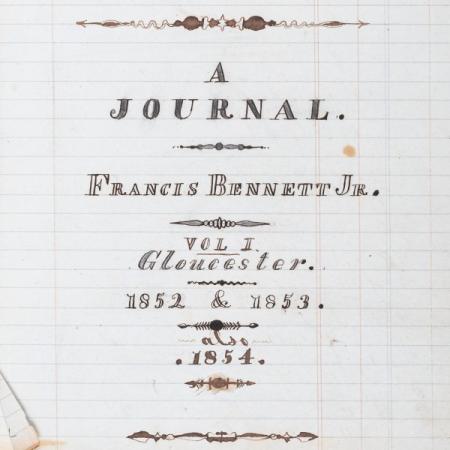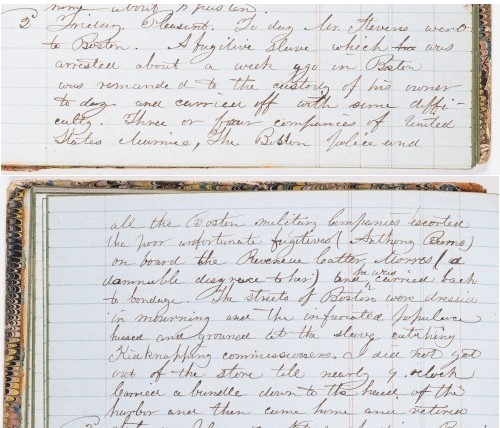
Francis Bennett, Jr. (1837-1929) was only between the ages of 15 and 16 when he kept this diary between January 10, 1852, and December 31, 1854, but he was already hard at work for Charles Fox Hovey and Company, a dry goods merchants on Summer Street in Boston, Massachusetts, a job he started in August 1854.
The diary is sparse for 1852 and 1853, and Francis mostly mentions games that he and his friends played, steamboat rides to islands off of Massachusetts, visits with relatives, picnics, parties, church services, and his father's departure for Calcutta on board the "Montpelier." Bennett also attended lectures given by American transcendentalist Theodore Parker (1810-1860), abolitionist Wendell Phillips (1811-1884), and writer Ralph Waldo Emerson (1803-1882).
During 1854, Bennett provided daily accounts of his activities, including visiting with friends, taking sleigh rides, and attending balls, lectures, book auctions, temperance meetings, town meetings, parades, and circuses.
But not all was fun and games for Bennett. In May 1854, he commented on the freedom seeker Anthony Burns’s (1834-1862) case. Anthony Burns was born into slavery in Virginia and escaped his enslavers in February 1854 by taking a boat to Boston. His location was discovered, and he was arrested under the Fugitive Slave act on May 24, 1854. Anti-slavery protests erupted throughout Boston, and an abolitionist killed a federal marshal, but Burns was re-enslaved in June. After the Burns case, Massachusetts passed strict laws that made it nearly impossible to return another freedom seeker to slavery. Northern abolitionists purchased Burns’s freedom in 1855.
Bennett wrote:
June 2 Friday. Pleasant. To day Mr. Stevens went to Boston. A fugitive slave which was arrested about a week ago in Boston was remanded to the custody of his owner to day and carried off with some difficulty. Three or four companies of United States Armies, the Boston police and all the Boston military companies escorted the poor unfortunate fugitive (Anthony Burns) on board the Revenue Cutter Morris (a damnable disgrace to her) and he was carried back to bondage. The streets of Boston were dressed in mourning and the infuriated populace hissed and groaned at the slave catching kidnapping commissioners. I did not get out of the store till nearly 9 o’clock. Carried a bundle down to the head of the harbor and then came home and retired.
Suggested Classroom Questions and Activities
Ask students to research the Fugitive Slave Act and write a short essay detailing the act and the role the Underground Railroad played in resisting the act. Use Bennett’s June 2, 1854, entry about Burns to incorporate first-hand accounts of what happened in Boston after the capture of Burns.
[Massachusetts History and Social Science Framework MA5.T5.1. Research primary sources such as antebellum newspapers, slave narratives, accounts of slave auctions, and the Fugitive Slave Act, to analyze one of the following aspects of slave life and resistance (e.g., the Stono Rebellion of 1739, the Haitian Revolution of 1791–1804, the rebellion of Denmark Vesey of 1822, the rebellion of Nat Turner in 1831; the role of the Underground Railroad; the development of ideas of racial superiority; the African American Colonization Society movement to deport and resettle freed African Americans in a colony in West Africa).
Again using Bennett’s first-hand account of reactions to Burns’s capture and return to slavery, analyze the Burns case by comparing Bennett’s account to an image produced in Boston in 1855 (available via the AAS catalog record). What are the authors of the print trying to say about Burns? How does their perspective compare with Bennett’s? Can you find any newspaper accounts from the same period to get a sense of what details were emphasized in a newspaper article?
[Common Core State Standards Initiative (CCSS.ELA-LITERACY) RST 9.7 Analyze various accounts of a subject told in different mediums (e.g., a person’s life story in both print and multimedia), determining which details are emphasized in each account.]
Audio
Listen to Francis' account of Anthony Burn's arrest as he recorded in his diary for June 2, 1854.
Transcript of recording:
Francis Bennett, Jr. , age sixteen. May 1854.
"June 2 Friday. Pleasant. To day Mr. Stevens went to Boston. A fugitive slave which was arrested about a week ago in Boston was remanded to the custody of his owner to day and carried off with some difficulty. Three or four companies of United States Armies, the Boston police and all the Boston military companies escorted the poor unfortunate fugitive (Anthony Burns) on board the Revenue Cutter Morris (a damnable disgrace to her) and he was carried back to bondage. The streets of Boston were dressed in mourning and the infuriated populace hissed and groaned at the slave catching kidnapping commissioners. I did not get out of the store till nearly 9 o’clock."